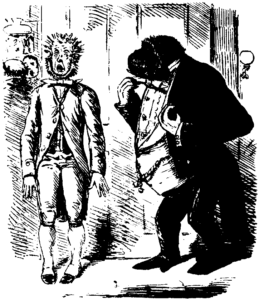In late January of 1999, The Discovery Institute’s Center for Science and Culture published an in-house document entitled “The Wedge.” The document contains the institute’s three-phase plan to drive a wedge into the public’s understanding of evolution and create an opening for intelligent design to be seen as a valid scientific theory. It was leaked to the public by Matt Duss, a part-time employee of the institute, and was posted to the internet by a friend of Duss’ on February 5, 1999.
The Wedge document begins by stating that human beings were created by God.
It then goes on to disparage the ideas of Charles Darwin, Karl Marx, and Sigmund Freud, whom the author blames for portraying humans as animals instead of spiritual beings created in God’s image and for undermining personal responsibility as a result by asserting that human behavior is dictated by biology and environment. The document states that the institute “seeks nothing less than the overthrow of materialism and its cultural legacies.”
The Goal of The Wedge Strategy
The goal of The Wedge Strategy is to “defeat scientific materialism and its destructive moral, cultural, and political legacies and to replace materialistic explanations with the theistic understanding that nature and human beings are created by God.” Three phases are listed for achieving this goal: Scientific research, writing, and publication; publicity and opinion-making; and cultural confrontation and renewal. Through these phases, the institute hopes to see intelligent design accepted as an alternative scientific theory to evolution within five years and for it to be the dominant theory within twenty years.
 After detailing how to go about implementing these three phases, the document ends with a list of books, academic articles, media appearances, and newspaper and magazine articles written by prominent intelligent design proponents to summarize the progress that the institute has made in furthering their goal thus far.
After detailing how to go about implementing these three phases, the document ends with a list of books, academic articles, media appearances, and newspaper and magazine articles written by prominent intelligent design proponents to summarize the progress that the institute has made in furthering their goal thus far.
Since its inception, The Discovery Institute has been attempting to engage the scientific community in debates in order to put intelligent design on equal footing with evolutionary theory. They have been somewhat successful in convincing the public that a controversy exists. “Teaching the controversy” in science classrooms sounds like a good idea at first glance; however, a closer look reveals that intelligent design is not a scientific theory. It is not testable or falsifiable, and it makes no predictions. It is a “God of the Gaps” argument and stops the scientific investigation at the limit of our current knowledge. Intelligent design can be taught in theology or philosophy classes but not as a part of the science curriculum.
The Darwinist Paranoia
The Center for Science and Culture recently attempted to address what they called “Darwinist paranoia” regarding The Wedge Strategy in a document called “The Wedge Document: So What?” This document gives answers to some common criticisms and states that the institute is not trying to attack science or advocate a theocracy for America; however, the document goes on to restate the same ideas that are in the original Wedge document. The Discovery Institute continues its mission to “teach the controversy” and to win public support for intelligent design as a valid scientific theory.
https://www.youtube.com/watch?v=yw7zqjIAIgU






